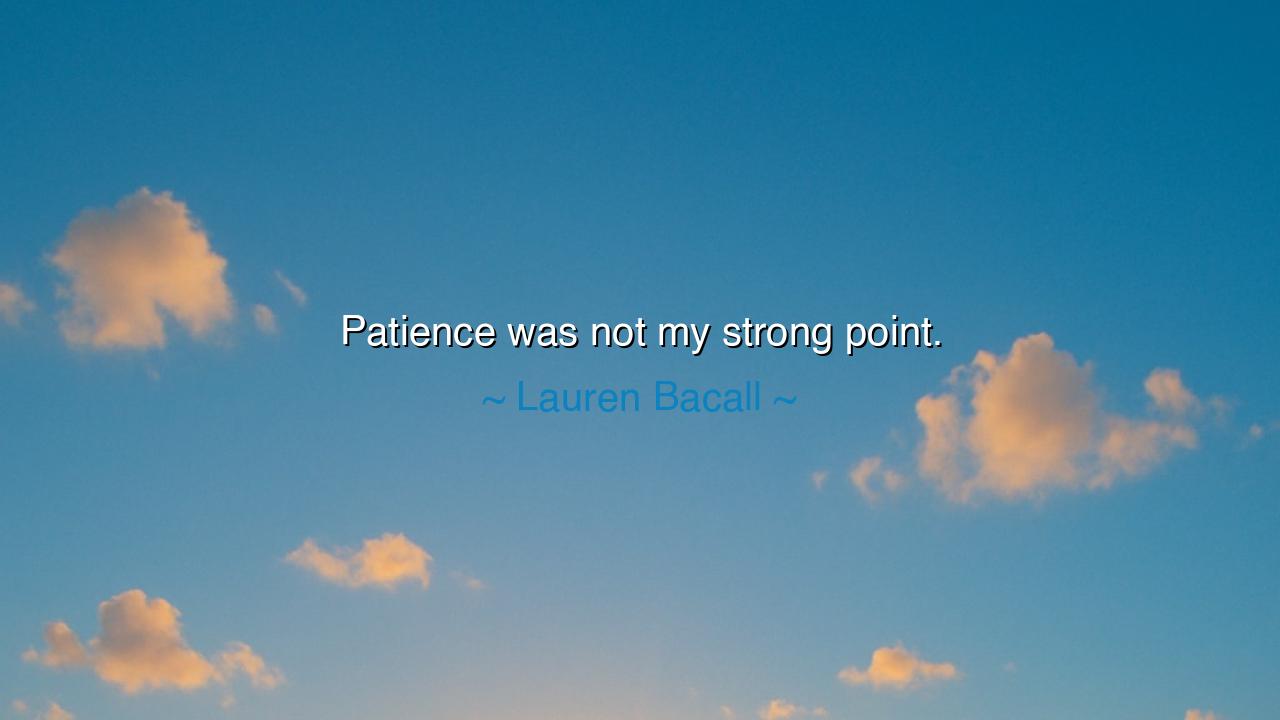
Patience was not my strong point.






Lauren Bacall once admitted with candor: “Patience was not my strong point.” These words, spoken by one of Hollywood’s most iconic figures, carry a weight far deeper than the simplicity of their phrasing. For in them we hear the voice of a woman whose life was filled with motion, urgency, and fire. To confess a lack of patience is not always to confess a weakness—it is sometimes to reveal a restless spirit that will not wait idly for destiny, but seizes it with unyielding hands.
The origin of this thought comes from Bacall’s own journey. From the moment she appeared on screen in To Have and Have Not, opposite Humphrey Bogart, her presence was commanding, her eyes filled with a fierce intensity that could not be contained. She was not one to wait passively for opportunity; she chased it, shaped it, demanded it. In a world where women were often asked to wait their turn, Bacall admitted her truth: patience was not her strength, and in that impatience lay her force of will, her boldness, her refusal to fade quietly into the background.
History offers us many figures whose lack of patience became the very engine of their greatness. Consider Alexander Hamilton, one of America’s founding fathers. Impatient to rise, impatient with the slow grinding of politics, he wrote, argued, and built with a fiery speed that carved his place in history. His impatience made him controversial, yes, but it also made him unforgettable. Bacall’s confession places her in that lineage of souls who find waiting unbearable because their spirits are too ablaze with urgency.
Yet, in her words lies also a warning. For while impatience may propel us forward, it may also rob us of peace. Many have burned themselves out too quickly, exhausting their strength before their time. The impatient heart must learn balance, lest its fire consume itself. Bacall’s brilliance was undeniable, but her reflection shows she knew her own restlessness, and perhaps recognized that patience, though not her ally, might have made her path smoother.
The deeper meaning is this: to lack patience is to feel life’s clock ticking too loudly. It is to sense that time is scarce, and that one must act now or be lost. Such urgency can bring greatness, but it must be tempered with wisdom. For there are seasons in life where waiting is as powerful as acting, where silence nurtures strength as surely as struggle. The one who cannot wait may miss the quiet blessings that unfold only with time.
Let us, then, take both sides of Bacall’s teaching. Let us admire her boldness, her refusal to sit idle, her restless pursuit of what she desired. But let us also heed the balance she implies. Impatience may carry you to the stage, but patience sustains you when the curtain falls. The art of life is to know when to push forward and when to stand still, trusting the slow and steady rhythms of fate.
In practice, we must ask ourselves: are we rushing when we should be waiting? Are we restless when silence might teach us? Or are we lingering when action is required? To live well is to master this dance of time. Let Bacall’s words be both a mirror and a guide: if you lack patience, know the fire within you—but also learn to temper it, lest it consume you.
Thus, let her truth echo to future generations: patience may not always be our strong point, yet without it, strength is incomplete. Seek balance, children of tomorrow. Run when the moment calls, but wait when the season demands. For both patience and impatience, when rightly guided, are instruments of destiny.






AAdministratorAdministrator
Welcome, honored guests. Please leave a comment, we will respond soon